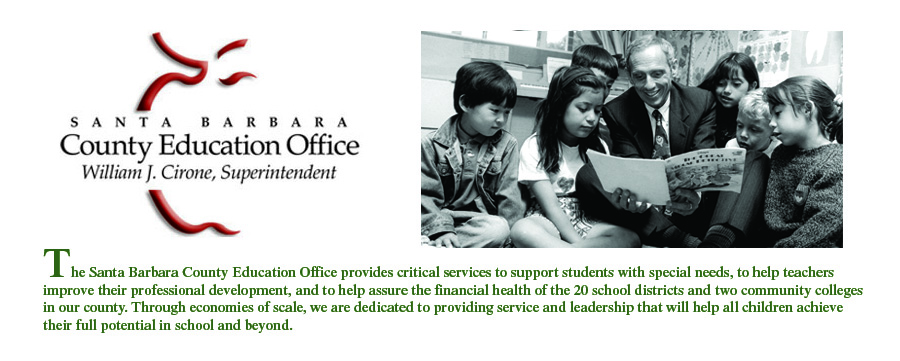By Bill Cirone, Santa Barbara County
Superintendent of Schools
Tom Friedman, The
New York Times columnist, recently wrote a book with Michael Mandelbaum
called, heart-breakingly, That Used to Be
Us. “I will be honest with you. It is our view that the American dream is
now in peril,” he stated.
And he made his case in a recent speech: “America is the tent pole that holds up the
world. If that tent pole buckles or fractures, your kids won’t just grow up in
a different America — they will grow up in a very different world,” he said.
The subtitle of the book adds a note of hope: How
America Fell Behind in the World It Invented and How We Can Come Back.
Friedman frames his argument around the Homeland
Security motto, “If you see something, say something.” His main message is that
we need to apply that exhortation to the country as a whole. We need to call
out the dangerous actions we see everywhere, especially in the area of
education, which is so vital to our democracy and our economy. If we see
something wrong, we have to say so.
It’s almost as though our country has suddenly become
paralyzed. Political gridlock, always a worrisome occurrence, has risen to a
point where it has stopped us dead in our tracks.
Friedman cites China as one example of this reality. In
2005, he said, getting to Tianjin, China involved a 3.5-hour car ride from
Beijing to a polluted, crowded Chinese version of Detroit. Five years later in
2010, when Friedman attended a conference in Tianjin, he boarded a world-class,
high-speed Chinese bullet train that covered 72 miles in 29 minutes. The
convention center was a massive, beautifully appointed structure with a total
floor area of 230,000 square meters. Construction of this began Sept. 15, 2009
and was completed May 2010. Eight months. Right now, that couldn’t happen in
the U.S.
When Friedman wrote his previous book in 2004, Facebook
didn’t exist. “Twitter was a sound, the cloud was in the sky, and 4G was a
parking place,” he said. “Applications were what you sent to college. Linked In
was a prison and Skype, for most people, was a typo.” The world has changed,
and the labor market has changed with it.
Friedman quoted John Jazwiec who has headed a variety of
technology companies and startups, and who also teaches MBA courses. Jazwiec
blogged, “I’m in the business of killing jobs…All of the companies I’ve been
CEO of through best-in-practice services and software, eliminate jobs…by
automation, outsourcing, and efficiencies of process. I have eliminated over
100,000 jobs in the worldwide economy from the software and services my
companies sell. I am a serial job killer.”
What is a sustainable job? “As a job killer — that’s me
— a sustainable job is a job I can’t kill, and I can’t kill creative people.
There is no productivity solution or outsourcing that I can sell to eliminate a
creative person. I can’t kill unique value creators,” wrote Jazwiec.
The people who do non-routine work — journalists,
dentists, doctors, physicists, computer scientists — for them the world works
better than ever, said Friedman. And that’s where education comes in.
“What it means is that we have two educational
challenges today. We need more education and we need better education,” he
said. Average is over. In a world where so many machines and available foreign
workers can now do average or better, the curve everyone is being graded on is
moving upward, he said. Average work will not return average wages anymore.
Friedman says to talk about education you must ask
employers what they’re looking for. He and his co-writer interviewed employers
in four categories: high-end white collar jobs, low-end white collar jobs, blue
collar jobs, and green collar jobs — the U.S. Army. All four said the same
thing: They are looking for people who
have critical reasoning and technical skills, who can adapt, invent, and
reinvent the job they are doing. One CEO told them, “We want every worker,
starting with the line worker, to be present, to be paying attention, because
that worker may have an insight that can drive enormous productivity or new
products.”
That means, said Friedman, that everyone has to find his
own unique value proposition. To become a creative lawyer, a creative
columnist, a creative factory worker, a creative service worker, everyone is
going to have to justify his or her value added. For some it will be inventing
a new product or service or reinventing an old one. For others it will be
reinventing themselves to do a routine task in a new or better way.
Mark Rosenberg, president of Florida International
University, said it is imperative that we become much better at educating
students not just to take good jobs, but to create good jobs.
Friedman has strong feelings about the current debates
that are raging in Congress. “We have to cut, we have to raise revenue, and we
have to invest,” he said. “But let’s start the conversation with what world
we’re in, not who can throw the biggest number on the table, and be the most
stubborn about saving something or cutting something.
“It’s an idiotic debate we are having, and it is
unworthy of our country right now and the responsibility we have to the
future,” he said.
“For all our ailments as a country and as a society, we
are still the most open in the world. Individuals with a spark of an idea, the
gumption to protest, or the passion to succeed can still get up and walk out
the door and chase a rainbow, lead a crusade, start a school, or open a
business.”
He’s absolutely right about that. We need to support
what is great about our country, including its educational backbone. We need to
draw lines in the sand and protect what we cherish.
If you see something, say something.
